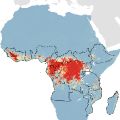
New maps to predict spread of Ebola
Oxford University research to predict the geographic spread of Ebola virus in West Africa has been funded by the UK government and the Wellcome Trust.
The Department for International Development (DFID) and the Wellcome Trust are releasing £1.34m from a joint fund to support five projects, run by leading British and international researchers, which will improve evidence and understanding of the Ebola outbreak.
In September this year Oxford University scientists developed maps showing where the Ebola virus is likely to be carried by animals and there is a risk of transmission to humans triggering future outbreaks. The new project will use data on human mobility, population density, and transport infrastructure in West African countries to create maps predicting how the current Ebola outbreak is likely to spread through human populations.
The project, led by Professor Simon Hay and Dr Nick Golding of Oxford's Department of Zoology, builds on methods developed to map the potential spread of diseases such as dengue fever and malaria, however it is the first time that these techniques have been applied to Ebola. The new maps will give indications of the risk of the virus spreading to neighbouring countries and will include summaries of health centres most likely to see new cases. Both the maps themselves and the online tools used to create them will be made freely available to help other teams studying and responding to the current and future Ebola outbreaks.
'The Ebola outbreak so far has been very focal. Most of the cases have occurred in a few hotspots, such as the Liberian capital Monrovia, with smaller outbreaks flaring up in other regions as the disease has been introduced by people travelling. As the hotspots are brought under control, understanding where these other outbreaks are likely to occur could help to decide where to prioritise disease surveillance,' said Dr Nick Golding of Oxford University's Department of Zoology.
'The scientific community has an increasingly good understanding of how human movements lead to diseases being introduced. By turning that scientific knowledge into a tool for monitoring the crisis and guiding surveillance, we hope to help use these countries' limited resources more effectively.'
Speaking about the five new projects, International Development Secretary Justine Greening said: 'I have seen for myself in Sierra Leone the devastation that Ebola can cause. The UK has taken the lead in tackling this outbreak in Sierra Leone. The first of six British-built treatment centres is now open and British funding is trebling the number of treatment beds, supporting burial teams, researching a vaccine and providing vital supplies for thousands of health workers. These ground-breaking new research projects have the potential to transform understanding of the disease.'
Dr Jeremy Farrar, Director of the Wellcome Trust said: 'Up until now, support for the Ebola outbreak has focused on improving public health measures by increasing facilities and equipment, and fast tracking vaccine and drug trials. However, without knowledge and understanding of local communities this life-saving work can often fail. This funding will address that gap by training medical staff to engage effectively with local people about key issues, improving diagnostic tests and providing predictive mapping of the spread of the disease.'
 New analysis of archaeological data reveals how agriculture and governance have shaped wealth inequality
New analysis of archaeological data reveals how agriculture and governance have shaped wealth inequality
 Cambridge victorious in Women's and Men's Boat Races 2025
Cambridge victorious in Women's and Men's Boat Races 2025
 Expert Comment: Ethical and legal challenges of uterus transplants in Mexico
Expert Comment: Ethical and legal challenges of uterus transplants in Mexico
 Risk of Ebola emergence mapped
Risk of Ebola emergence mapped